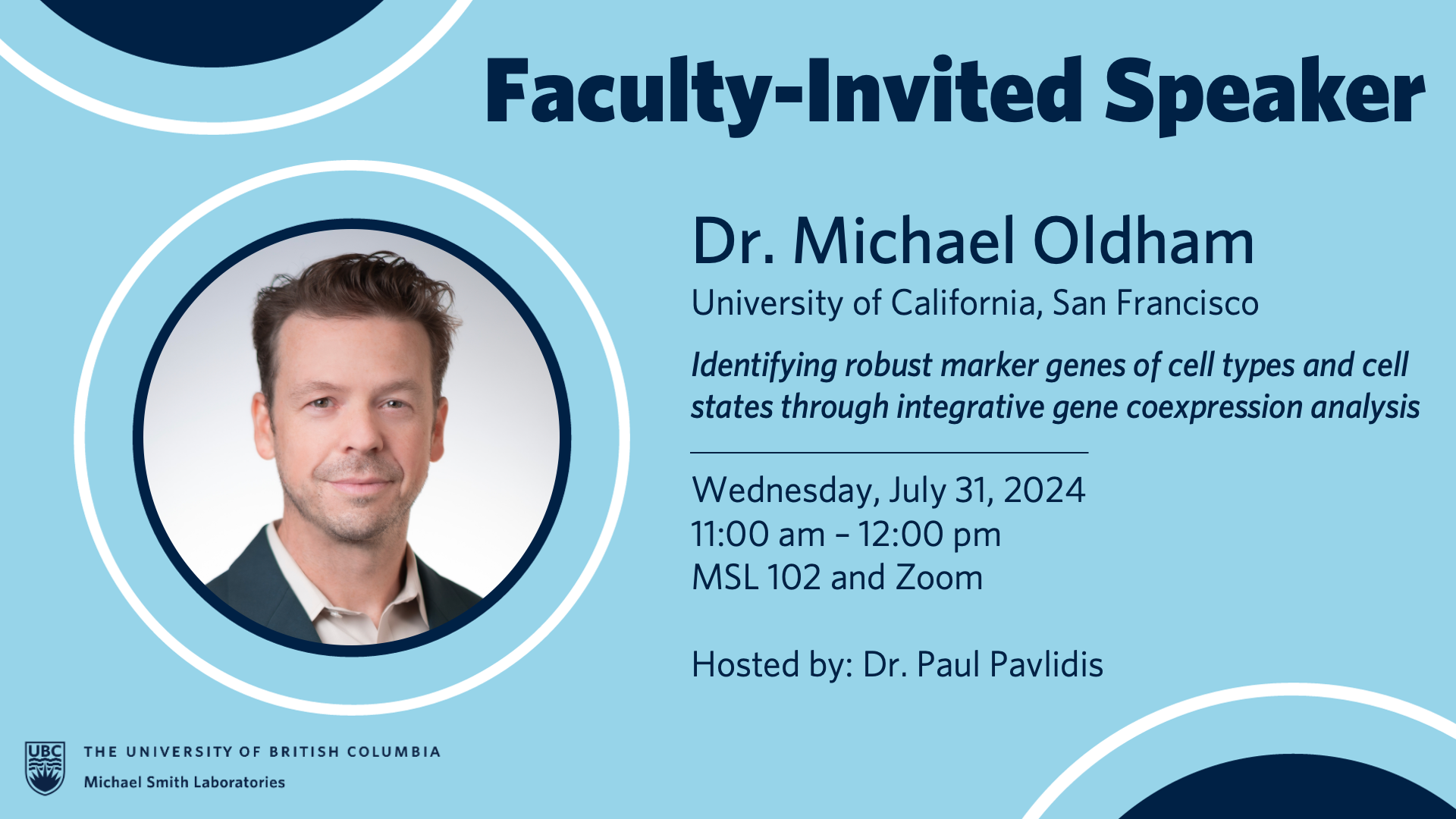
- This event has passed.
Faculty-Invited Speaker: Dr. Michael Oldham
July 31, 2024 @ 11:00 am - 12:00 pm

Dr. Michael Oldham from the Weill Institute for Neurosciences at the University of California, San Francisco, will be delivering a talk on July 31st from 11:00 am – 12:00 pm in the MSL seminar room (MSL 102). This visit has been organized by Dr. Paul Pavlidis.
If you are unable to attend in person, the talk will be presented in a hybrid format, and we invite you to register at the following Zoom link: https://ubc.zoom.us/meeting/register/u5YvcemsrT4vE9TaA0bPQdZXV_hxjpB_DA82.
After registering, you will receive a confirmation email with information for joining the meeting.
Talk title: Identifying robust marker genes of cell types and cell states through integrative gene coexpression analysis
Abstract: Identifying molecular features that optimally distinguish subpopulations of cells is a major goal of biomedical research. To achieve this goal, most studies attempt to physically isolate cells and compare the relative abundance of molecular features for subpopulations of interest (e.g., differential expression analysis). We have developed an alternative approach for target discovery that aggregates correlations between molecular features and cellular abundance in datasets produced from bulk tissue samples. Using this approach, we have defined the core transcriptional identities of major CNS cell types in humans and mice, identifying functionally significant gene expression differences that impact brain development and cellular morphologies. Extending this approach to cancer, we propose that aggregating correlations between molecular features and tumor purity in bulk datasets provides an efficient strategy for identifying optimal markers of malignant cells. I will discuss the statistical, economic, and practical advantages of our approach vis-à-vis single-cell methods, along with its limitations and ideal use cases.
Bio: Dr. Oldham is a neuroscientist and Associate Professor in the Department of Neurological Surgery and Brain Tumor Center at UCSF. Over the past twenty years he has developed and applied novel computational and experimental strategies to study the cellular and molecular organization of human brain samples in non-pathological and diseased states. He received his PhD at UCLA in the lab of Dan Geschwind, where he worked with Steve Horvath to perform some of the earliest analyses of transcriptional covariation in the human brain and discovered highly reproducible gene coexpression modules corresponding to cell types that had been invisible to differential expression analysis. Based on this work he was awarded the Kavan Prize for Excellence in Brain Research by UCLA and unanimously selected as a UCSF Sandler Faculty Fellow. As a PI and Sandler Fellow in the UCSF Broad Stem Cell Center, he developed and applied computational and experimental strategies for identifying functionally significant, cell-type-specific gene expression differences between humans and mice during brain development. After completing his Sandler Fellowship, Dr. Oldham was recruited to join the faculty of the Department of Neurological Surgery and Brain Tumor Center at UCSF and apply the methods he had developed to study malignant gliomas. Dr. Oldham is a faculty member in the UCSF PhD programs for Neuroscience, Biomedical Sciences, Developmental and Stem Cell Biology, and Biomedical Informatics. He is also strongly interested in developing new strategies to modernize scholarly communication around data analysis.